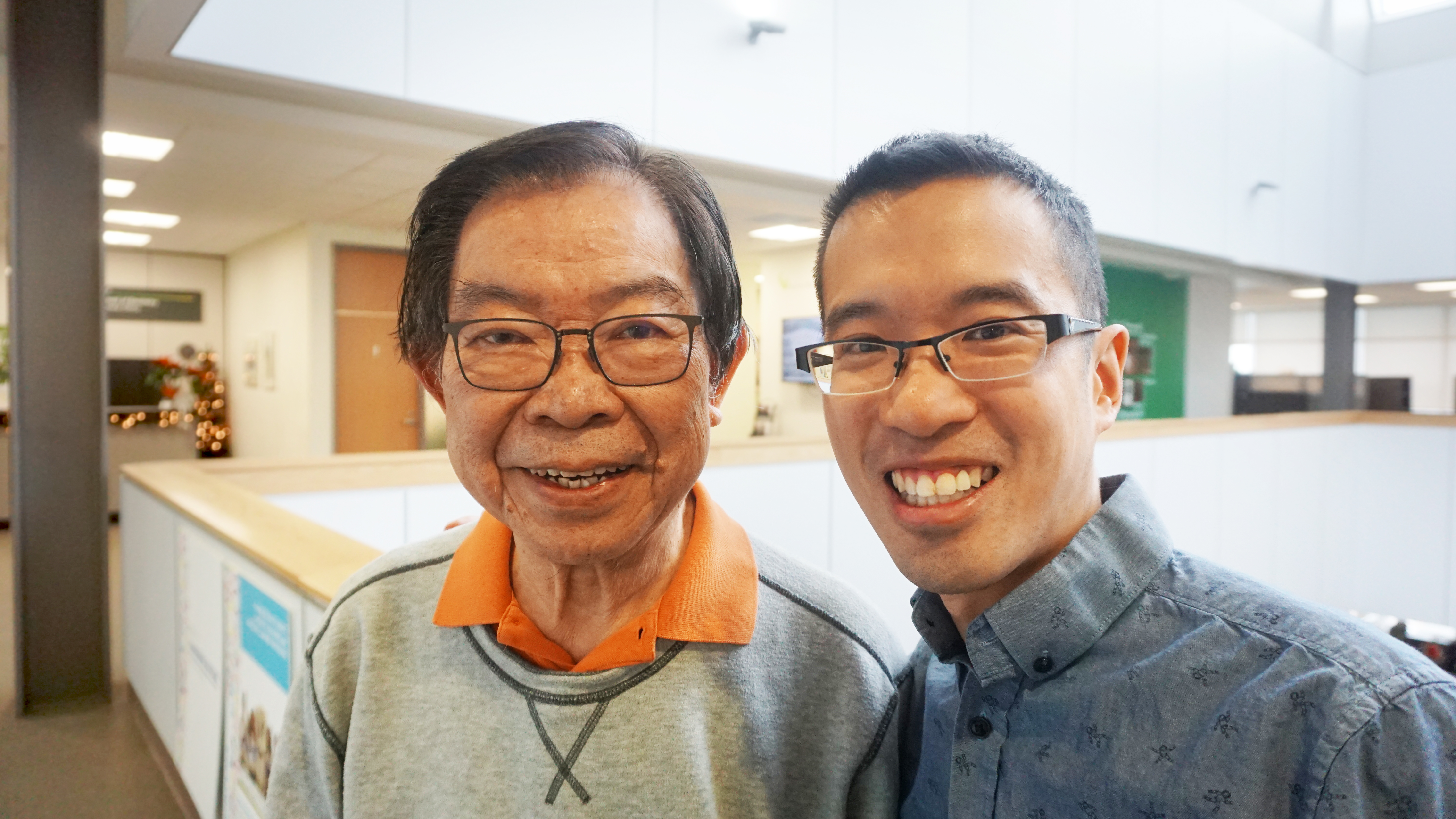
Drs. Kin and Andrew Wong, father and son
Dr. Kin Wong started in pre-clinical, working with students on mannequins, or what he calls, “The ideal patients! They don’t talk back or complain and their mouths are always a dry work environment!” He retired at the end of 2019, teaching those same classes. “I completed a closed circle: nice and round.”
Since 1976, there have been so many changes in techniques and equipment (not to mention everything being digital now), but Wong believes the biggest changes surround attitudes and teaching practices.
“In the early 80s, everything was lumped together and we all taught everything. One day, dentures, the next, working with kids.” Nowadays, the clinic is divided into disciplines, and students learn more in detail from a specialist.
“This is better. We can only teach as much as we know. It’s the same in Medicine: you wouldn’t have a GP teaching brain surgery!”
While it’s always been about the best care for the patients, Wong believes industry views have really shifted. “You used to fit the patient to the treatment rather than the treatment to the patients.”
Despite the advancements in equipment, Wong is nostalgic about old techniques. Gold foil fillings, for one. “When I graduated, we swore by gold fillings and inlays. Ten years later, grads had never heard of them. We realized we were getting old then!”
When the School moved to ECHA, Kaye Edmonton, and Katz, back in 2012, Wong says, “They took down all the old equipment and put it in the archives here.” But, like battle-hardened veterans, he and his year-mates were “proud of being trained on limited equipment and still being able to produce high-quality work.”
“Family explorer”
The conversation shifted to family. “I was the explorer in my family, the first one to become a dentist! Becoming a dentist was never the plan.” He did engineering for his first year and didn’t like it. “Someone suggested dentistry to me, and I knew nothing about dentistry at the time… But somehow I got in and after I did, I developed a love for dentistry.”
Wong’s son, Andrew Wong, a pediatric dentist and an instructor, says his father inspired him.“Dad was amazing,” says Andrew. “Seeing how he interacted with me and the other students, not just in teaching, but showing and working with them, inspired me to do a lot of things, including to become a dentist and coming to school here. I really loved it.”
Wong says, “I tried not to influence what Andrew was going to be when he grew up. I gave him his options, but I told him not to become a root canal specialist, because I knew he wouldn’t like it! When he picked pediatrics, I said, ‘You made the right choice.’”
Teacher’s pet? Hardly!
Wong says, “Teaching my son was a real challenge. I liked to teach him like any other student, but had to tread very carefully so that other students didn’t feel like I was playing favourites.
Andrew pipes up, “Honestly, he may have been harder on me than the others. Like the other end of favouritism. When I did something a little wrong, it was completely wrong!”
“Students are what I’ll really miss.”
“We had many great students through the years,” says Wong.
“I remember one genius student. Back in the day, we had belt-driven handpieces for our drills. One day in a pedo clinic, a kid was being difficult to manage. The student tried to talk him into opening his mouth, but he wouldn’t. So the student tied a cotton ball to the handpiece, and set it to go around and around. He told the kid, “Watch the white rabbit going around and around.” It put the kid right to sleep! Hypnotized him! He was snoring away, so the student could work on him .”
I do; I understand
“There’s a Chinese proverb that inspired me throughout my career, ‘I hear I forget, I see I remember, I do I understand.’ Seeing my students succeed is so rewarding. It’s not monetary or being known, I can just feel it. It’s intangible.”
As instructors, Wong explains, “We were clinicians first. No one taught us how to teach. We just figured it out.”
“There’s an art to teaching professional school. It’s different than teaching high school. I wouldn’t be able to control that class! Students here are professionals in their own right, and we don’t want to change them too much.”
Wong says working with patients is something that comes naturally to him, but teaching it is another matter. “You can’t modify the relationship between the student and the patient. When you interrupt that mixture, the students will not be themselves anymore. They’ll do what they think you want, but that bad behaviour might show up outside the school when they’re working. Instead, you just have to slowly infuse it into the students.”
“Did I do something to help students?” he asks.
Andrew says, “I have to say you did. Throughout life, I learned from him. He’s always been a gentle and kind person, and tried to teach students to be with patients.”
“Teaching itself is a philosophical argument. There’s always some good and some bad. Teaching the students from the first years of not knowing what a drill looks like, to graduating as practicing dentists is really something.” He looks wistful for a moment.
“But time has to move on! Now they can put me in the archives with all that old equipment !"